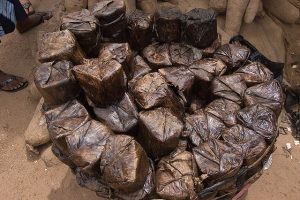 Kenkey is a staple dish usually served with pepper sauce and fried fish or soup, stew
Kenkey is a staple dish usually served with pepper sauce and fried fish or soup, stew
Yamoransa, the hub of the kenkey making industry in Ghana would soon benefit from an ultra-modern kenkey processing factory under the government's industrialisation strategy to expand local economies.
The facility would be fully furnished with state-of-the-art equipment and facilities including; washrooms, borehole and grinding machines to aid the processing of large quantities of hygienic kenkey for the local and international markets.
Mrs Comfort Garbrah, the Assembly Woman for Yamoransa Electoral Area who announced this at a durbar to mark the international Women's Day said the construction of the factory would be facilitated by the Mfantsiman Municipal Assembly with support from the Chiefs of the area and the private sector.
The women would also be given periodic training programmes on healthy ways of preparing kenkey, branding, financial literacy, book keeping, customer service and other empowerment programmes to promote their businesses.
The Assembly Woman encouraged the women engaged in the kenkey business to form groups to enable them take full advantage of the initiative and other opportunities that may come from government.
She also called for increased support and advocacy for women especially those in coastal communities to help improve on their lives.
According to her, the lack of ready support and advocacy for women in rural communities had led to increased poverty, unemployment and illiteracy, creating a wider gap of inequalities between fishing and non-fishing communities.
Professor Akua Britwum, Director at the Centre for Gender Research, Advocacy and Documentation (CEGRAD) observed that though women had achieved a lot over the years, there was a lot to be done to achieve gender parity, and this she added could be attained when young girls stayed in school and reaped the fruits of education.
She advised parents to cut down their huge expenses on frivolous activities, show keen interest and invest deeply into the education of their children.
Speaking in an interview with the Ghana News Agency after the programme, some women engaged in the kenkey making business appealed to government to allow them supply kenkey to all senior high schools across the country to create employment for the youth and also help keep them in business.
They identified illiteracy, lack of jobs and access to flexible loans to expand their business as some of the challenges women in the area faced and called on civil society organisations and corporate bodies to get on board to support them.
They also called for assistance on alternative means of livelihoods and other social support programmes to reduce poverty and unemployment in the area.